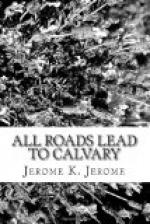They fell into a silence. Joan found herself dreaming.
Yes, it was true. It must have been the beginning of all things. Man, pitiless, deaf, blind, groping in the darkness, knowing not even himself. And to her vision, far off, out of the mist, he shaped himself before her: that dim, first standard-bearer of the Lord, the man who first felt pity. Savage, brutish, dumb—lonely there amid the desolation, staring down at some hurt creature, man or beast it mattered not, his dull eyes troubled with a strange new pain he understood not.
And suddenly, as he stooped, there must have come a great light into his eyes.
Man had heard God’s voice across the deep, and had made answer.
CHAPTER XV
The years that followed—till, like some shipwrecked swimmer to whom returning light reveals the land, she felt new life and hopes come back to her—always remained in her memory vague, confused; a jumble of events, thoughts, feelings, without sequence or connection.
She had gone down to Liverpool, intending to persuade her father to leave the control of the works to Arthur, and to come and live with her in London; but had left without broaching the subject. There were nights when she would trapse the streets till she would almost fall exhausted, rather than face the solitude awaiting her in her own rooms. But so also there were moods when, like some stricken animal, her instinct was to shun all living things. At such times his presence, for all his loving patience, would have been as a knife in her wound. Besides, he would always be there, when escape from herself for a while became an absolute necessity. More and more she had come to regard him as her comforter. Not from anything he ever said or did. Rather, it seemed to her, because that with him she felt no need of words.
The works, since Arthur had shared the management, had gradually been regaining their position; and he had urged her to let him increase her allowance.
“It will give you greater freedom,” he had suggested with fine assumption of propounding a mere business proposition; “enabling you to choose your work entirely for its own sake. I have always wanted to take a hand in helping things on. It will come to just the same, your doing it for me.”
She had suppressed a smile, and had accepted. “Thanks, Dad,” she had answered. “It will be nice, having you as my backer.”
Her admiration of the independent woman had undergone some modification since she had come in contact with her. Woman was intended to be dependent upon man. It was the part appointed to him in the social scheme. Woman had hers, no less important. Earning her own living did not improve her. It was one of the drawbacks of civilization that so many had to do it of necessity. It developed her on the wrong lines—against her nature. This cry of the unsexed: that woman must always be the paid servant instead of the helper of man—paid for being mother, paid for being wife! Why not carry it to its logical conclusion, and insist that she should be paid for her embraces? That she should share in man’s labour, in his hopes, that was the true comradeship. What mattered it, who held the purse-strings!




